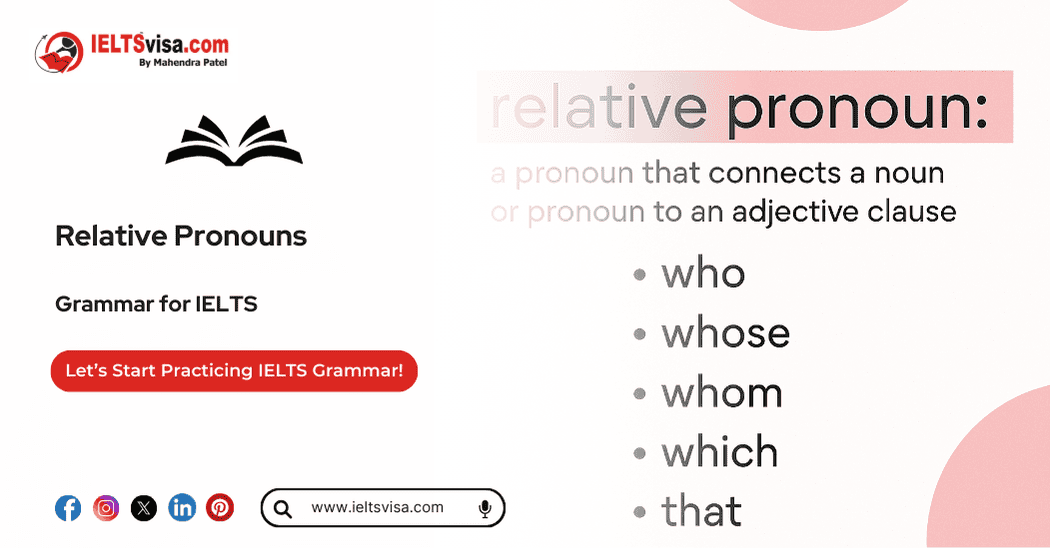Relative, Restrictive, and Non-Restrictive Clauses in IELTS Grammar
Grammar for IELTS
Relative, Restrictive, and Non-Restrictive Clauses
Understanding how to use relative clauses correctly can greatly improve your writing and speaking score in the IELTS exam. These clauses help you add more detail to your sentences and show a strong command of complex grammar structures.
What Is a Relative Clause?
A relative clause is a type of dependent clause that provides more information about a noun or pronoun in the main sentence. It begins with a relative pronoun like:
-
- who
- whom
- whose
- which
- that
Restrictive vs Non-restrictive Clauses (The Big Difference)
1. Restrictive Relative Clauses (Defining Clauses)
-
-
Give essential information that identifies which person/thing you mean.
-
No commas.
-
“That” is common in informal style.
-
Examples
-
-
The book that I read last night was fascinating.
-
Students who submit on time receive feedback quickly.
-
If you remove the clause, meaning changes or becomes unclear.
2. Non-restrictive Relative Clauses (Non-defining Clauses)
-
-
Give extra, non-essential information.
-
Use commas before and after the clause.
-
Do not use “that.” Use who/which/whose.
-
Examples
-
-
John, who is my neighbour, is a great cook.
-
The IELTS exam, which millions take each year, is highly competitive.
-
If you remove the clause, the sentence still makes sense.
Relative Pronouns & Adverbs: Quick Guide
| Word | Refers to | Role | Example |
|---|---|---|---|
| who | people | subject | The teacher who helped me was kind. |
| whom | people | object (formal) | The professor whom I emailed replied quickly. |
| whose | possession | person/thing | The artist whose painting won is 22. |
| which | things/animals | subject/object | The phone which I bought is affordable. |
| that | people/things | subject/object; restrictive only | The film that won the award was French. |
| where | places | relative adverb | The café where we met has closed. |
| when | times | relative adverb | The year when I graduated was tough. |
| why | reasons | relative adverb | The reason why he left is unclear. |
Omitting the pronoun: If the relative pronoun is the object, you can drop it in restrictive clauses.
-
-
The book (that/which) I read was great.
-
The person (whom/who) I met is a designer.
-
Punctuation Rules You Must Nail
-
-
No commas with restrictive clauses: The woman who called is my client.
-
Commas with non-restrictive clauses: The woman, who called earlier, is my client.
-
Never use that in a non-restrictive clause.
-
Building Richer Sentences with Relative Clauses
Relative clauses help you merge ideas, avoid repetition, and sound more academic—ideal for IELTS.
Combining sentences
-
I met a man. He speaks five languages.
→ I met a man who speaks five languages. -
The woman’s car was stolen. She reported it.
→ The woman whose car was stolen reported it to the police.
Powerful IELTS Verbs + Relative Clauses (High-Band Patterns)
Use these verb frames to build precise, complex sentences. The relative clause (bold) identifies who/what.
1) Gives … (a chance/opportunity) to/that/which
-
-
Studying abroad gives students who love languages a chance to immerse themselves.
-
Online programs give learners who cannot attend in person the opportunity to earn a degree.
-
2) Allows … to/for
-
-
Technology allows people who live remotely to access healthcare and education.
-
Scholarships allow individuals who lack funds to pursue university study.
-
Renewables allow for a reduction in emissions.
-
3) Enables … to/that
-
-
Social media enables businesses that seek broader reach to advertise globally.
-
Recent tools enable scientists who study climate to gather more accurate data.
-
4) Means (that/which)
-
-
E-commerce means that consumers who live in rural areas can buy goods online.
-
High urban costs mean that many who work in cities must commute long distances.
-
5) Makes it possible/easy/difficult (to/for/that)
-
-
Online shopping makes it easy for people who are busy to order from home.
-
Affordable housing makes it possible for young adults who are starting out to live independently.
-
A complex tax code makes it difficult for those who are not experts to file returns.
-
6) Prevents/Stops … from (that/which)
-
-
Lack of coverage prevents people who are uninsured from seeking treatment.
-
Limited transport stops residents who live in rural areas from accessing jobs.
-
7) Provides … with (that/which)
-
-
Governments provide citizens who are struggling with welfare programs that cover basic needs.
-
Universities provide students with resources which improve academic success.
-
8) Requires … to/from/that
-
-
A medical career requires people who are interested to complete extensive training.
-
Many roles require that employees who serve customers have strong communication skills.
-
9) Shows/Demonstrates/Indicates/Implies/Suggests (that/who/what/when/where)
-
-
Research shows that students who join clubs develop leadership.
-
Data indicates that people who live in polluted areas face higher risks.
-
The rise of remote work suggests that companies which adopt flexibility may attract talent.
-
10) Helps/Leads/Offers
-
-
Regular exercise helps people who want to manage weight build muscle.
-
Excessive social media leads to behaviours that reduce face-to-face contact.
-
Universities offer programs that allow students who love entrepreneurship to build startups.
-
Using “The” with Abstract Nouns (Situations, Qualities, Changes)
While abstract nouns (ideas, processes, or conditions) often don’t require articles, use “the” when referring to a specific instance of such a concept.
Examples:
-
-
The rise of populism in Europe is concerning.
-
The process of globalization affects every nation.
-
The situation in the Middle East remains tense.
-
The change in consumer habits is driven by technology.
-
The development of new technologies fuels innovation.
-
IELTS Writing Task 1: Using Restrictive Clauses (Great for Introductions)
These defining clauses pinpoint exactly which data you are describing:
-
-
The chart shows the number of students who passed in each subject.
-
The graph indicates the percentage of households that own a car in each city.
-
The table compares money spent on entertainment by people who belong to different age groups.
-
The diagram illustrates the process that is used to manufacture solar panels.
-
The map highlights areas that are at risk of flooding during the rainy season.
-
The table lists average salaries of employees who work in various industries.
-
The graph displays tourists who visited the country over five years.
-
The chart shows the percentage of citizens who have access to clean water.
-
IELTS Writing Task 1: Using Non-restrictive Clauses (Add Credibility & Detail)
These non-defining clauses add source or method—perfect after your first sentence. Use commas.
-
-
The data, which was collected by the national statistics office, shows a steady rise.
-
The graph, which is based on government figures, illustrates a decline in bus usage.
-
The map, which was created using satellite imagery, highlights polluted zones.
-
The chart, which was prepared by university researchers, displays literacy rates.
-
The diagram, which was designed by engineers, shows a wind turbine’s components.
-
IELTS Writing Task 2: High-Band Sentences with Relative Clauses
-
-
Technology, which has advanced rapidly in recent years, has transformed communication.
-
Governments should subsidise students who cannot afford tuition.
-
The Internet, which billions use daily, is reshaping education.
-
Cities that invest in public transport often reduce congestion and emissions.
-
IELTS Speaking: Natural Use of Relative Clauses
Part 1
-
-
My hometown, which is near the mountains, is very peaceful.
-
I enjoy books that have complex characters.
-
Part 2 (Cue-card flavour)
-
-
I’ll describe a teacher who inspired me, whose lessons were always engaging.
-
I want to talk about the house where I grew up, which was a cosy cottage.
-
Part 3 (Opinion/analysis)
-
-
People who read regularly generally develop stronger vocabulary, which benefits academic writing.
-
Advanced Grammar for Band 8+: Reduced & Embedded Relative Clauses
A) Reduced Relative Clauses (when be is implied)
-
-
Full: Students who are interested in AI should apply.
-
Reduced: Students interested in AI should apply.
-
Full: The data which were collected in 2024 show…
-
Reduced: Data collected in 2024 show…
-
Use in Task 1/2 to sound concise and formal.
B) Preposition + Relative Pronoun (formal)
-
-
The principle on which this method is based…
-
The city in which I lived (or: where I lived).
-
C) Embedded/Double Relative Clauses
-
-
The students who joined the program which the university launched last year reported higher satisfaction.
-
Frequent Errors (and Fast Fixes)
| Error | Why it’s wrong | Correct form |
|---|---|---|
| My brother, that lives in Canada, … | “that” not allowed in non-restrictive | My brother, who lives in Canada, … |
| Missing commas in non-restrictive | Confuses meaning | The museum, which opened in 1920, is famous. |
| Using which for people | Wrong referent | The woman who called … |
| Overusing that | Too informal for essays | Prefer which/who in Task 2 |
| No pronoun where needed | Unclear subject/object | The policy which was introduced… |
Practice: Quick Drills (with Answers)
Fill the gap with who/whom/whose/which/that/where/when/why (use commas if needed).
1. The report ___ was published yesterday shows a rise in costs.
2. The woman ___ I met at the seminar works at UNICEF.
3. The town ___ I was born has excellent transport.
4. The company, ___ CEO resigned, cut spending.
5. The reason ___ many students prefer online courses is flexibility.
6. 2019 was the year ___ the reforms began.
7. The students ___ complete the task early receive bonus marks.
8. The library, ___ was renovated last year, now has a café.
Answers: 1) which/that 2) whom/who 3) where 4) whose 5) why 6) when 7) who/that 8) which
At-a-Glance Summary
| Type | Purpose | Commas? | Example |
|---|---|---|---|
| Restrictive (defining) | Identifies exactly which noun | No | The students who revise daily improve fastest. |
| Non-restrictive (non-defining) | Adds extra info | Yes | My sister, who lives in London, is an engineer. |
| Reduced | Concise, formal | — | Data collected in 2024 show growth. |

Our Books
Master IELTS Speaking Part 1
IELTS Writing Task 1 Book
IELTS Writing Task 2 Book
Practice IELTS Other Modules
IELTS Listening
The IELTS Listening test assesses how well you can understand spoken English in various contexts. It lasts about 30 minutes and is divided into four sections with a total of 40 questions. The listening tasks become increasingly difficult as the test progresses.
IELTS Academic Reading
The IELTS Academic Reading section assesses your ability to understand and interpret a variety of texts in academic settings. It is designed to evaluate a range of reading skills, including skimming for gist, reading for main ideas, reading for detail, understanding inferences, and recognizing a writer's opinions and arguments.
IELTS Speaking
The IELTS Speaking test assesses your ability to communicate in English on everyday topics. It lasts 11-14 minutes and consists of three parts: introduction, cue card, and a discussion based on the cue card topic.
IELTS General Reading
IELTS General Reading tests your ability to understand and interpret various types of texts. Here are some key areas and types of content you can expect to encounter in the reading section, along with tips for effective preparation.
IELTS Academic Writing Task 1
In IELTS Academic Writing Task 1, you are presented with a visual representation of information, such as graphs, charts, tables, or diagrams, and you are required to summarize, compare, or explain the data in your own words.
IELTS General Writing Task 1
In IELTS General Writing Task 1, you are required to write a letter based on a given situation. The letter can be formal, semi-formal, or informal, depending on the prompt. Here’s a breakdown of the key components to include in your letter
IELTS Academic Writing Task 2
In IELTS Academic Writing Task 2, you are required to write an essay in response to a question or topic. Here’s a guide to help you understand the essential elements of this task
IELTS Exam Tips
To succeed in the IELTS exam, practice regularly, familiarize yourself with the test format, improve your vocabulary, develop time management skills, and take mock tests to build confidence.
Grammer for IELTS
Grammar is the foundation of effective communication in English. Understanding tense usage, subject-verb agreement, and sentence structure enhances clarity and coherence in writing and speaking.
Vocabulary for IELTS
Vocabulary plays a crucial role in the IELTS (International English Language Testing System) exam, especially in the Speaking and Writing sections. Here’s an overview of why vocabulary is important and how it impacts your performance
RECENT IELTS SAMPLES QUESTIONS AND ANSWERS
IELTS Speaking Part 1 – Favourite Sujbect – Physics
IELTS Speaking Part 1 - Favourite Sujbect - Physics Q: What is your favourite subject? A: My favourite subject...
IELTS Speaking Part 1 – Present Situation (Student)
IELTS Speaking Part 1 - Present Situation (Student) Q1: Are you a student or do you work?A: I’m a full-time...
IELTS Speaking Part 1 – Present Situation – Employee – as an International Student and Social Worker
IELTS Speaking Part 1 - Present Situation - Employee - as an International Student and Social Worker Q1: Are...
IELTS Speaking Part 1 – Persent Situation – Employee- as an Electric Engineer
IELTS Speaking Part 1 - Persent Situation - Employee- as an Electric Engineer Q1: What do you do for a...
IELTS Speaking Part 1 – Persent Situation – Employee – as an Software Engineer
IELTS Speaking Part 1 - Persent Situation - Employee - as an Software Engineer Q1: What do you do for a...
IELTS Speaking Part 1 – Persent Situation – Married
IELTS Speaking Part 1 - Persent Situation - Married Q1: Are you married?A: Yes, I am married. My spouse and I...




















